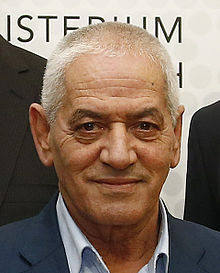Houcine Abassi
Houcine Abassi ( Arabic حسين العباسي, DMG Houcine Abbassi , * 1947 in Sbikha ) is a Tunisian teacher, trade unionist and chairman of the trade union umbrella organization Union Générale Tunisienne du Travail (UGTT), in German for "Tunisian Workers' Association".
After the revolutionary Arab Spring, Abassi achieved a compromise between Islamists and seculars for the new constitution of Tunisia in the process of national dialogue . For this, he and five other representatives of Tunisian civil society received the Nobel Peace Prize in 2015 .
Life
Abassi was born in Sbikha in 1947. He worked as a teacher before becoming a senior advisor in the Ministry of Education in 1971. In 1973 he joined the UGTT and performed various regional and national tasks. In 2011 Abassi was elected chairman of the UGTT.
As a result of the 2010/2011 revolution in Tunisia, the constituent national assembly was elected on October 23, 2011, from which the moderate Islamist party Ennahda emerged as the winner, which then formed the government together with the secular parties CPR and Ettakatol, which are considered center-left educated. However, the creation of the new constitution took a long time. The plan was to complete the process in twelve months. Meanwhile, however, two attacks increased tensions in the country and peaked in August 2013. The democratization process was seriously jeopardized. In this environment, the UGTT tried to initiate a first dialogue in 2012 with Abassi at the helm. This failed due to the blockade of the Ennahda. In September 2013 a second attempt was started with better preparation, this time with four participants - the Quartet du dialogue national . This managed to get both the three ruling parties (Ennahda, CPR and Ettakatol) and the opposition parties that were represented in parliament (including Nidaa Tounes , Aljomhoury, Almassar, Afek Tounes and Aljabha chaabia ) around one table and ultimately a constitution to elaborate for Tunisia. Abassi was highly regarded by observers for showing no ambitions for political office in Tunisia from his influential position.
Honors
- German Africa Prize 2015 of the German Africa Foundation eV
See also
Individual evidence
- ↑ Anette Steinich http://www.nzz.ch/international/naher-osten-und-nordafrika/houcine-abassi--der-vater-des-dialogs-1.18409407
- ↑ Archive link ( Memento from December 11, 2015 in the Internet Archive )
| personal data | |
|---|---|
| SURNAME | Abassi, Houcine |
| ALTERNATIVE NAMES | حسين العباسي (Arabic) |
| BRIEF DESCRIPTION | Tunisian teacher and trade unionist |
| DATE OF BIRTH | 1947 |
| PLACE OF BIRTH | Sbikha |
